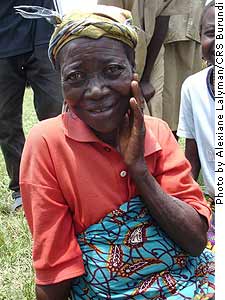
Contact: Elizabeth Griffin, Director of Communications, Catholic Relief Services, 410-951-7361, egriffin@crs.org; The following report is by Kai T. Hill, associate web producer for CRS
BALTIMORE, June 29 /Standard Newswire/ -- After her husband and children were killed several years ago in the civil war that ravaged Burundi, Madeleine, 65, found herself trying to pick up the pieces of her life with no way to earn a living.
Photo: Madeleine, 65, received a temporary job through a CRS cash-for-work program.
Stricken with grief, the elderly widow also fell victim to the heavy rains that plagued the northern and central plateau regions of
Madeleine, 65, received a temporary job through a CRS cash-for-work program.
Madeleine worked in the fields of her neighbors, earning about 50 cents a day and, sometimes, a single meal. But most days she would go to bed at night cringing with hunger.
This year, Catholic Relief Services gave Madeleine and thousands like her a helping hand.
A Hand Up
After participating in a seed fair sponsored by CRS Burundi, Madeleine is confident that she will see a plentiful crop that will provide enough food for her own table, as well as surplus to sell for a profit after the June harvest.
Madeleine also was happy to be chosen for one of CRS Burundi's cash-for-work projects. In lieu of traditional food distribution programs, CRS provides about 16,000 locals a daily wage for temporary work.
"I was fortunate to participate in both the CRS Cash-for-Work project and seed fairs," says Madeleine, who lives in her birth village, Musigati, in
By organizing seed fairs, CRS Burundi has helped thousands of impoverished families and small merchant farmers. Many who have benefited from the fairs only recently returned to the labor of rebuilding their lives and healing from the horrors of the civil war that took hold of the country from 1993 to 2005.
Francois and his family were displaced for several years during the war. They returned home in August of 2006, only to have their farming plans hindered by the heavy rains.
"I only have a small plot of land, but I didn't have any money to buy seeds," Francois says. "I am thankful that I was able to get at the seed fair more than 28 pounds of good-quality bean seeds that grow well in this region. Thank you, CRS."
Small-scale farmers wait in line at a CRS seed fair.
Freedom of Choice
With the help of local partners, the fairs are established in various provinces. The most vulnerable families receive vouchers to buy seeds from a select group of local seed producers who, in turn, redeem the vouchers for cash at the end of the day.
In addition to helping families rebound from the cycle of poverty, the voucher system — which is used by CRS in over 25 countries around the world — gives farmers the freedom to select the variety and quantity of seeds they want. Supporting local seed growers is also a means to stimulate the local economy.
The seed fairs, held in March, assisted an estimated 62,000 households. Each family got about $7.50 worth of vouchers.
"Until I heard about the CRS seed fair, I didn't know what I was going to tell my younger brother and sister," says 17-year-old Solange, who is an orphan and the head of her household. Solange cares for her three younger siblings at the family's home. She, too, lost all of her crop during the rains.
Since 2002, more than 470,000 vulnerable Burundian households have benefited from seed fair programs.
Our Work in
CRS has worked in Burundi since 1961, implementing development projects and providing emergency relief during times of war and natural disaster. The agency also supports local partners in their efforts to bridge ethnic differences, and provides assistance in areas such as sustainable agriculture, HIV and AIDS, and peacebuilding.
Kai Hill is an associate web producer for CRS. She works in the




 Sign Up to Receive Press Releases:
Sign Up to Receive Press Releases: